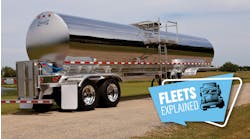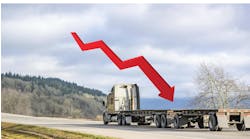Analysts at ACT Research see the odds of a recession growing in the face of price pressure on consumers and other factors weighing down the economy and the trucking industry, the research group reported in its latest Commercial Vehicle Dealer Digest.
Said Kenny Vieth, ACT’s president and senior analyst, “There is a growing consensus around the notion that we promote here: A slowdown is coming. We don’t know if it will be shallower or deeper.”
See also: Another indicator points to trouble in Class 8 truck market
That opinion has been joined by several other analysts inside and outside trucking in recent days. A report the same day from the Bureau of Economic Analysis (BEA) showed the primary driver that has been propping up the economy—brisk consumer demand—beginning to weaken. The S&P 500 also ended a dismal first half of 2022 on June 30—its worst since 1970—with losses at 20%.
The BEA reported June 29 that the U.S. economy shrank during the first quarter of 2022 at a slightly faster rate than previously estimated, with real gross domestic product declining at an annualized rate of 1.6% from January to March. The previous forecast released in April predicted a 1.4% contraction.
As for ACT, its dealer digest combines proprietary data analysis from a variety of industry sources and paints a picture of trends impacting transportation and commercial vehicle markets. This monthly report includes a forecast summary, complete with transportation insights for use by commercial vehicle dealer executives, reviewing top-level considerations such as for-hire indices, freight, heavy- and medium-duty segments, the total U.S. trailer market, used truck sales information, and a review of the U.S. macro economy, according to the June 30 release from the research firm.
See also: Truck Tonnage Index rises 0.5% in May
“With the current head of steam that includes healthy consumer and business balance sheets, strong employment demand, and pent-up manufacturing sector activity, this inflation-driven economic slowdown is, on one hand, somewhat unique. On the other, traditional recession predictors are in play: Fed rate hikes, high energy prices, negative exogenous events, and falling equity valuations come to mind,” Vieth added.
About what ACT thinks this means for commercial vehicle demand and build for the remainder of 2022, he stated, “At this point, still strong carrier profitability and pent-up demand mean that this year’s expectations for commercial vehicle demand remain essentially unchanged, with full-year production volumes still primarily dependent on supply-chain outcomes.”




